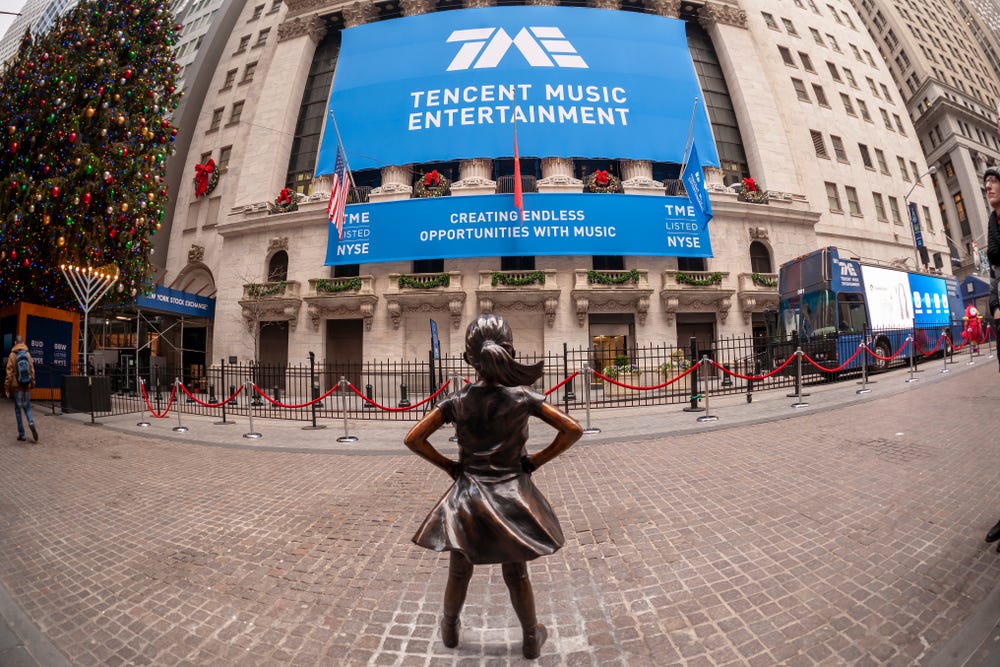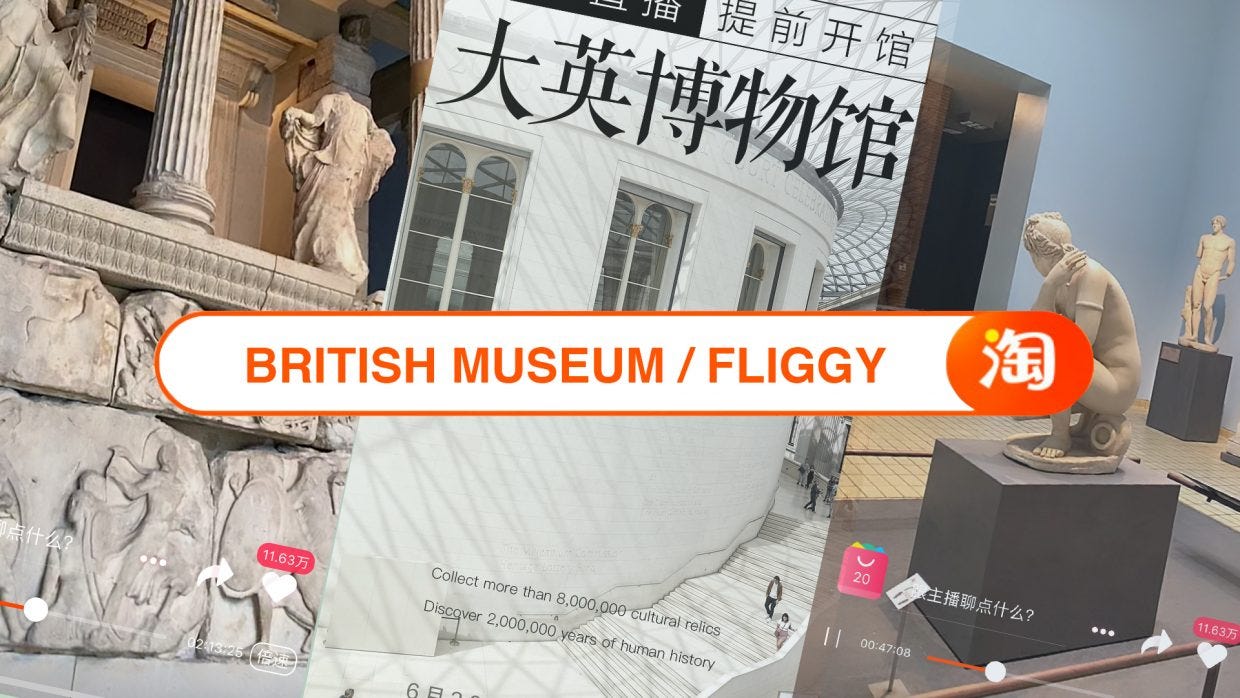“The Auction of the Future Is Here”: Livestreaming Hits a Global High Note With Art Sales Success
Plus: Defusing a red-hot lawsuit, Bilibili celebrates its creators, and is Tencent Music unstoppable?

E-commerce livestreaming is making an enormous leap from “big in China” onto the global stage with a series of high-stakes art auctions showing how anything can be sold through an online broadcast, even the world’s priciest art, if given the right promotion and attention to production.
Sotheby’s was first to test out the new format with its digital auction event on June 29, which replaced the previously postponed May sales. With London as the headquarters and specialists on hand in Hong Kong and New York, the five-hour livestream was offered via Sotheby’s own website as well as the on the video news network Cheddar (which is owned by telecoms billionaire Patrick Drahi, who took Sotheby’s private last year).
Oliver Barker, chairman of Sotheby’s Europe, was the night’s auctioneer. Standing before a wall of screens showing the action in London, Hong Kong, New York, and online, Barker described the experience as “like being at the epicenter of a cinematic production.” His commentary throughout the evening and dramatic shots of specialists transmitting bids added to the entertainment value and drew comparisons to game shows.
The 74 lots, spanning the Impressionist to contemporary eras, brought in a total of $363.2 million. A Francis Bacon triptych was the biggest sale at $84.6 million, exceeding the top of its $60-80 million estimate, and five other works sold for more than $10 million, including a Jean-Michel Basquiat drawing that set a record for the highest online bid at an auction at $15.2 million. An online underbidder in China went as far as offering $73.1 million for the Bacon triptych before bowing out, highlighting the willingness to spend big via the internet.
On July 2, Phillips presented a smaller sale using a hybrid in-person and online format, building on its years of experience presenting livestreamed auctions and developing digital tools for online and mobile live-bidding. Phillips’ event also saw its auctioneer stationed in London, as screens toggled between sales rooms in New York and Hong Kong. Despite some technical glitches, the auction sold all of its 25 lots and landed at the midpoint of its estimate range of $29.4-$41.6 million.
Christie’s is up next with a relay-style event coming up on July 10 that is expected to bring in at least $336 million. The livestreamed auctions will move consecutively across time zones to cover the major art centers of Hong Kong, Paris, London, and New York, led by the principal auctioneer of each location. To promote the auction, Christie’s has produced virtual gallery tours with 360-degree views, audio guides by specialists, and augmented reality features that allow viewers to use mobile phones and tablets to place artworks in their homes and inspect them in detail.
Despite concerns earlier in the coronavirus pandemic that distressed sellers would flood the art market, it appears that collectors have been holding on. The current wave of auctions is notable for both the high-quality of the works being offered as well as the apparent pent-up demand from buyers around the world, with New York the most active location for the recent Sotheby’s auction.
The sales so far have been much smaller than comparable in-person events a year ago, when Sotheby’s raised $692 million and Phillips drew $102 million, but they represent a major confidence boost and are just the start of a bigger transition already under way. Even before the coronavirus, the emerging younger generation of digitally-savvy collectors had shown a strong willingness to purchase art online, with 93% of millennial high-net-worth collectors doing so, according to a 2019 report by Art Basel & UBS.

Companion (Detail of Crowd Shot) by KAWS was among the 25 lots offered at Phillips' July 2 auction, where it sold for $1,380,000.
Mentioned in today’s newsletter: Bilibili, Bytedance, Cheddar, Christie’s, Fliggy, Lao Gan Ma, Phillips, Sotheby’s, Tencent Music, the British Museum.
Tencent Music's Acquisition Spree is Creating a Global Content Commerce Giant

Rather than being an easily categorizable tech and media company, China’s Tencent is more like an assemblage of virtually every type of company in virtually every industry, ranging from film production and video streaming to messaging, music, gaming, e-commerce, banking, and online payment. Founded in 1998, the Shenzhen-based conglomerate has gone fully global at supersonic speed after recording exponential growth and diversification in its home market in the first decade of the 2000s, and for the last decade — and undoubtedly in the next as well — Tencent’s major focus has been global expansion via strategic acquisitions.
Among these, perhaps the most eye-catching in the West have been in gaming and entertainment, led by Tencent’s 2011 acquisition of the American video game developer Riot Games, its purchase of a majority stake of Supercell (developer of Clash of Clans) in 2016, and its move to take a 12% stake in Snap Inc. in 2017.
But these are just the deals that attracted widespread attention overseas. In recent years, and with no sign of slowing, Tencent has been gobbling up companies within and outside of China with an eye on creating a content commerce giant — one that touches every aspect of consumers’ lives, from producing and distributing the entertainment they consume to merging it with user-generated content, commerce, payment, and recommendation to endlessly repeat the cycle.
Read the full story on Content Commerce Insider
How Tencent and Lao Gan Ma Used Content to Defuse Lawsuit Tensions

It’s a curious case: Back in March, internet giant Tencent filed a lawsuit in Shenzhen, where it is based, against the popular chili sauce brand Lao Gan Ma, alleging a failure to pay more than RMB 16 million ($2.3 million) in fees for a marketing tie-up with Tencent’s QQ Speed game that had been agreed upon in a contract signed a year earlier.
The court responded by ordering a freeze on Lao Gan Ma’s assets, news of which was just released last week, drawing widespread attention. Lao Gan Mao claimed ignorance of the contract, and it turns out that one of China’s biggest tech companies had been taken in by a couple of fraudsters with fake company seals. Their scam? Reselling promotional gaming codes provided by Tencent under the marketing arrangement.
The case has raised questions of how it was possible for Tencent’s employees to be duped so easily, and why no one at Lao Gan Ma appeared to take notice of the multi-million dollar ad campaign running on its behalf. But rather than address those troubling issues, the parties have turned to social media and memes to make light of the situation.
On Weibo, Tencent put out an offer of a reward of 1,000 jars of Lao Gan Ma chili sauce for tips that could help the company in its investigation of the scam. Taking a page from the Alibaba book of crisis PR, the company also produced a comic video featuring its penguin mascot pitifully crying about how naive it was to consume fake chili sauce, and shared photos of the day’s menu at the corporate cafeteria: plain rice topped with Lao Gan Ma’s spicy condiment.
Lao Gan Ma responded on its Tmall flagship store with an offer of 1,000 jars of chili sauce “exclusively for major customers” and promoted the slogan “follow Lao Gan Ma so you don’t get lost.” The brand has seen a major boost in interest as a result of the controversy, with searches on Tmall up 220% year-on-year on July 1, a twofold increase in sales transactions in some regions, and a bump in traffic to its sales livestreams, with many viewers posting comments in support of the brand during the broadcast.
Money Streams: British Museum and Fliggy’s Latest Partnership

The coronavirus lockdowns have brought the trend of e-commerce livestreaming into the hallowed halls of global cultural institutions. The British Museum recently partnered with Alibaba’s travel platform Fliggy for a two-hour broadcast that served to both engage Chinese audiences who remain unable to travel internationally and generate much-needed revenue for the still-shuttered institution, which normally sees 6 million visitors a year.
As a docent guided viewers through galleries of Egyptian, Greek, Roman, and Islamic art, links to related products available on the museum’s official Tmall store popped up at the bottom of the screen. The British Museum was the first international art museum to launch a Tmall store in 2018, and it has developed an array of IP products created specifically for the Chinese market.
Fliggy has been boosting its cultural livestream presence to compete with rival platforms such as Ctrip and Qunar, with plans to host more than 100 daily broadcasts from overseas.
And while the British Museum remains closed, it has just launched an “Ancient Egypt Pop-Up Store” in a Shanghai shopping mall, which will be open for four months and marks its biggest physical move into China to date.
Read the full story on Jing Travel
Brand Film Pick: Bilibili Celebrates Creators for Its Birthday
June 26 marked 11 years since the founding of Bilibili, the popular youth-oriented video platform. Once considered a niche online community for China’s active ACG (anime, comics and games) subculture, Bilibili has expanded to cover all areas of contemporary life and culture and has more than tripled its audience over the past three years to 172 million monthly active users, who watch a collective 1.1 billion videos every day.
As part of Bilibili’s recent anniversary celebration, an analogy was drawn from the company’s age — Bilibili is a child and, like all 11-year-olds, will continue to discover and grow. So too will Bilibili's viewers, suggests renowned brand film director Zhang Dapeng in “Happy Encounter” (喜相逢), the final film in a brand trilogy that included the viral video “Rear Wave” (后浪) for China’s May 4 Youth Day, and “Enter the Sea” (入海) a music video with a song by pop star Mao Buyi honoring the Class of 2020 graduates.
The latest film promotes Bilibili as the meeting place for both fun and education. Premiering at the end of Bilibili’s livestreamed anniversary celebration, “Happy Encounter” follows an older Bilibili content creator (known as an Uploader) as he goes on an uncomfortable first date and later tracks down some of the platform’s most influential Uploaders to take part in his latest video project. The style is reminiscent of other brand films by Zhang such as “What is Peppa?” (啥是佩奇?), which served as the promo to the feature film “Peppa Pig Celebrates Chinese New Year,” combining earthiness, humor, and realism to develop an empathetic emotional response.
With cameos from celebrated digital vlogger He Tongxue, fitness coach Zoey (周六野Zoey), and law professor Luo Xiang (罗翔说刑法), among many others, Zhang demonstrates the breadth of entertainment and knowledge that Bilibili’s 1.8 million monthly active Uploaders can offer. And while the film’s protagonist is much older than Bilibili's average 21-year-old viewer, this “uncle” is both passionate and deeply familiar with the platform, conveying the message that Bilibili is for everyone — a critical point for the video platform as it both broadens its audience demographic and sees its early users grow up.
- by Benjamin Guggenheim, CCI Team
News in English
Chinese celebrities and influencers are going global as more brands tap them for international campaigns. Business of Fashion
Shopping on short video: Bytedance seeks to diversify its sources of revenues beyond advertising by building up Douyin’s e-commerce livestreaming business. Nikkei Asian Review
On Bytedance’s U.S. side, TikTok’s new CEO Kevin Mayer sees livestreaming as a “great area to expand” and he wants to build a broader audience for the platform. Deadline
The beauty industry is likely to be among the most affected by new rules on e-commerce livestreaming as they account for 35% of livestream sales. Cosmetics Design Asia
A South Korean cartoon series was taken off the air in China following viewer complaints about the colorful hair and outfits sported by the characters. SCMP
Schools of online sales: Platforms such as Pinduoduo, Taobao, and Meituan Dianping have all established their own “universities” to hasten the digital transformation of retail. Pandaily
A new “China hustle?” A warning on digital manipulation and questionable accounting practices used by some U.S.-listed tech firms. Technode
We’ve Got China Covered
China Film Insider: Idol Competition Reality Show “Chuang 2020” Wraps With Lukewarm Reception
Jing Daily: Will Your Brand Survive the Chinese Decade?
Jing Travel: Can Tencent Revive Chinese Tourism in Italy?


